1. Determine the Type of Soil
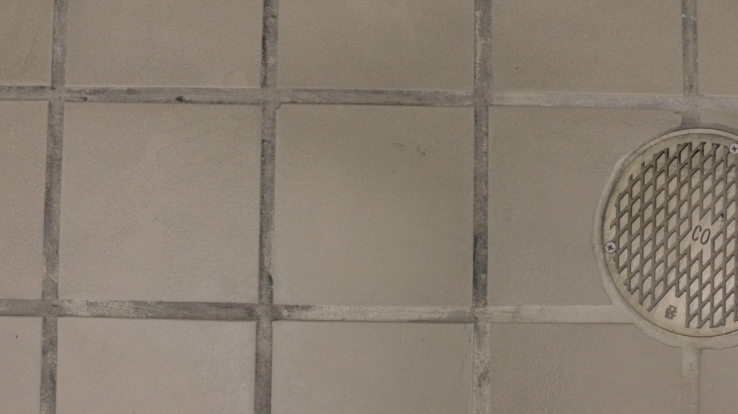
The kind of cleaner you should use will depend on which kind of soil is on the floor. Acidic cleaners are more effective at cleaning alkaline-based soils, such as hard water. These soils can form insoluble salts that are easily removed by the acid
in cleaners like MAD, Green Earth® Restroom Cleaner, and Tile Clean.
The following soils are usually found in bathroom and shower areas of facilities and can be cleaned with acidic cleaners:
- Hard water stains
- Soap scum
- Urine
- Mold and mildew
- Rust
Alkaline cleaners/degreasers are best used for eliminating acid-based soils and fats, oils, and greases (FOGs). The alkalinity in degreasers like Super Kemite®,
Ultra 2000™, and Citrus Chisel works to break down these soils, and a high surfactant suspends them in solution for the best results. The following can be cleaned with these
types of products:
- Cooking oils and greases found in kitchens and cafeterias
- Body oils found in showers and locker rooms
- Motor oil
- General soil embedment
Stay Informed: Take Clean Further with Betco
Subscribe to Betco emails to join thousands of other industry professionals and get the most helpful blog posts, the latest news, new product notifications, and invitations to our events conveniently in your inbox!
Yes, Sign Me Up!
2. Verify Your Floor Type
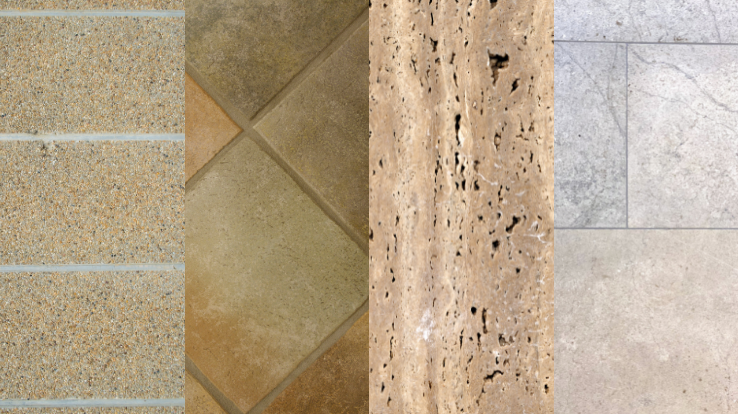
Knowing which type of cleaner is most appropriate for which soils, however, is not enough. It is important to also match the floor substrate with the correct cleaner, because certain flooring types can have adverse reactions to different cleaning
products.
Many natural and cementitious floor types react negatively to acid-based cleaners. These floors contain chemicals like calcium carbonate or other salts that can oxidize and cause etch and stain, damaging floors. For this reason, we recommend cleaning
alkaline soils with neutral pH Green Earth® Peroxide Cleaner instead of an acid cleaner on:
- Terrazzo
- Sand stone
- Lime stone
- Concrete
- Quartz
- Travertine
- Marble
On the other hand, porcelain, glazed, and quarry tile, as well as grout lines, brick, and slate CAN tolerate acid cleaners.
While appropriate for use on most other floor types, degreasers should NOT be used on:
- Porcelain tile
- Glazed tile
A white insoluble haze can be created by chemicals in certain degreasers, forming semi-permanent bonds to the above surfaces, which is why Green Earth Peroxide Cleaner should be used for FOGs and acid-based soils instead in these cases.
While some floors, like brick and concrete, are easy to identify, others are more challenging. If the floor type is unknown, use these tests to help determine the type of grouted floor:
- See if the tile absorbs water by pouring a small amount on the surface. If the tile has darkened, the water has absorbed. Stone tiles absorb water.
- Inspect the tile for variations, coloration, and markings:
- Marble has veins throughout the tile.
- Travertine has holes filled with resin, which feels smooth to the touch.
- Ceramic and porcelain tiles’ characteristics are in a more uniform pattern.
- A glaze may also be present if there is a thin line above the joint. Ceramic tiles have a glaze while stone and porcelain tiles do not.
- Quarry tile is usually a dark red color and unglazed without a pattern. It tends to have a rough texture and mimic the look of bricks.
- Texture can also help determine what kind of grouted floor. A uniformed texture may be a porcelain tile floor, while natural stone tiles will have irregularities.
When floor type cannot be ascertained, Green Earth Peroxide Cleaner or another mild daily peroxide cleaner can be safely used to clean and whiten tile and grout.
3. Use the Correct Equipment Accessories
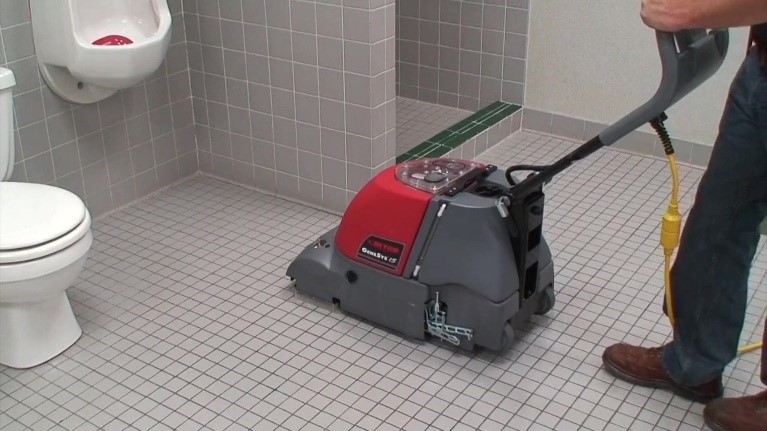
Stone, tile, and grout floors are porous and sometimes uneven, so brushes or pads that can get into the crevasses will increase the cleaning efficacy during interim and restorative maintenance.
- Disk auto scrubber: Use stiff brushes. (Call 1-877-856-5954 for assistance with choosing the correct brush.)
- Orbital machine: Use green turf pads and other brushes designed for square machines. (Stealth™ Orbital: SKU E84073-00, GeneSys™ Orbital: SKU E84074-00)
- If equipment is not available: Use a stiff bristle brush or broom.
View our equipment brochure to learn about our machines and determine which one will best fit your specific needs.
4. Follow Manufacturer's Directions for Sealing
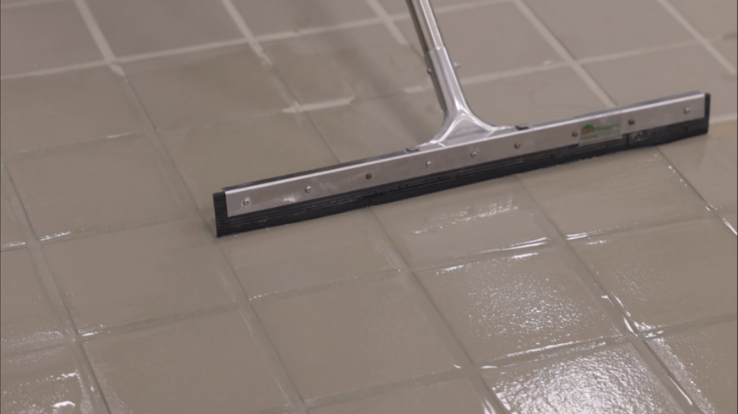
Most manufacturers actually require floor sealing after cleaning, because it reduces the porous nature of stone, tile, and grout floors and helps prevent staining and dirt embedment. To seal a floor:
- Make sure the floor is clean and dry.
- Thoroughly saturate all surfaces and grout with sealer using a synthetic mop, sponge, or squeegee. Apply sealer at a 45-degree angle for best results.
- Use a second coat of sealer on more porous surfaces.
STG Maintenance Program
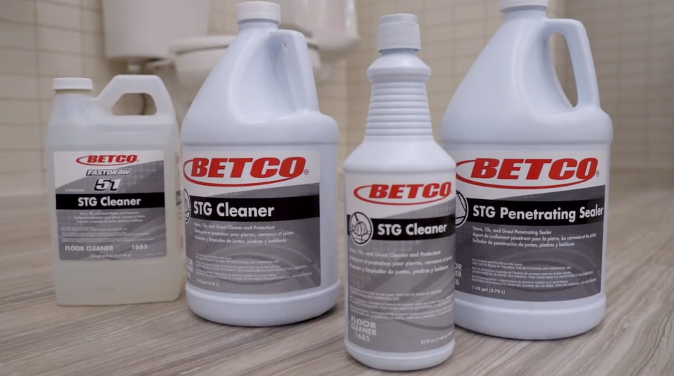
Still need help determining which cleaning products to use for interim or restorative maintenance? Click here to view a decision map for
a variety of floor types and soils, part of our new Stone, Tile, and Grout (STG) Maintenance Program!
This program provides a simple and easy solution to clean and protect these notoriously difficult-to-clean floors with innovative products, procedures, and training programs. In addition to cleaners for interim and restorative maintenance, the program
also offers STG Penetrating Sealer to prevent
stain and soil embedment with 25% more wear for extended use versus the competition. For routine maintenance, STG Cleaner uses Easy Clean Technology to form a barrier to block stains and expels soils for a deeper daily clean.
Regardless of phase in the lifecycle of floor care, our selector guide quiz can help determine
which products suit the needs of your grouted floor the best, and the following videos can teach you the proper processes for use:
If interested in the STG Maintenance Program, please click here to contact us for more information.